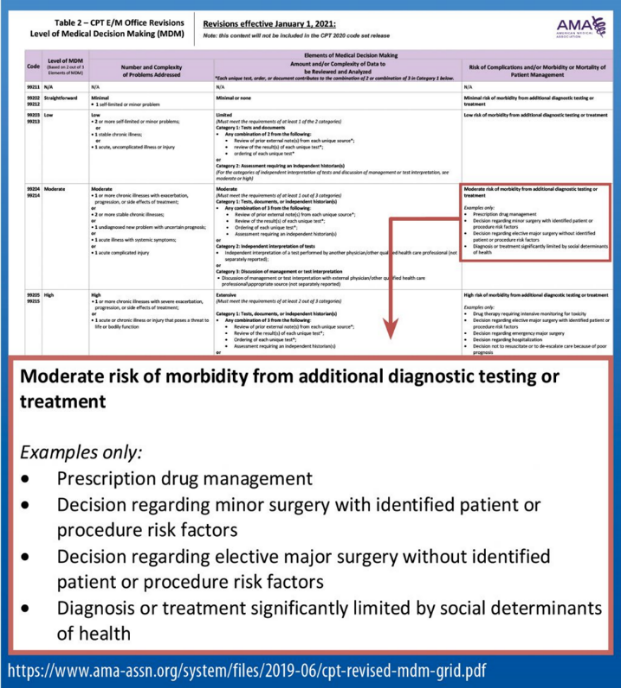2021 AMA Coding Guidelines for Social Determinants of Health (SDoH)
Date: 04/16/21
A Message for Providers. Please share with your Clinical, Billing and Coding teams.
New American Medical Association (AMA) Coding Guidelines
At Sunflower Health Plan, we work to improve not only the health of our members, but also the economic and social issues that can act as barriers to proper care. Social factors, including education, social supports and poverty, can affect a person’s risk factors for premature death and life expectancy.
Assessing the impacts of SDoH is essential to the achievement of greater health equity. The first step to improving health equity is by measuring it!
- New AMA Coding Guidelines - Effective January 1, 2021, new AMA coding guidelines allow providers to use ICD-10-CM Z55-Z65 SDoH codes as a reason for moderate risk under Medical Decision Making (MDM) when coding for office or other outpatient services. Examples of "Diagnosis or treatment significantly limited by SDoH" may be a determinant factor in MDM "Moderate risk of morbidity from additional diagnostic testing and treatment" www.ama-assn.org/system/files/2019-06/cpt-revised-mdm-grid.pdf). The addition of SDoH into the MDM Grid revision for 2021 can have a significant impact on proper payment, population health and disease management.
- How to Document SDoH – Discussing SDoH with your patients is the first step in helping address social risk. When you submit claims, please add the appropriate supplemental ICD-10 diagnosis codes that identify SDoH. Utilizing these codes will allow providers and Sunflower Health Plan to collect data and identify solutions to closely align patient's needs.
- Commonly used SDoH ICD-10 codes (Refer to the current year ICD-10 CM manual for additional codes and guidelines) - Z55-Education, Z56-Employment, Z59-Housing and Economic, Z60-Social Environment, Z61-Life Events, Z62-Upbringing, Z63-Family and Social Suppot Issues, Z64-Psychosocial Circumstances, Z65-Experiencees with Crime, Violence, and the Judicial Systems.

Sunflower SDoH and Community Resources
The following are resources that providers can try to mitigate SDoH gaps for their patients:
Sunflower has partnered with Harvesters to provide a nutritious food box to members who experience food insecurity and are living in Clay, Douglas, Franklin, Jackson, Jefferson, Johnson, Marshall, Miami, Nemaha, Osage, Pottawatomie, Riley, Shawnee, Wabaunsee, Washington and Wyandotte counties. To access this support, the member can call Customer Service.
- Farmer’s Market Vouchers – Medicaid members can receive produce vouchers worth $10 at special events with participating Farmers Markets. Members will receive postcards when it is available in their area.
- Sunflower Transition to Employment Program (STEP) is an employment support resource program. We help our Medicaid members identify and remove employment barriers through a discussion with an internal employment specialist. Benefits include enhanced transportation coverage, GED Ready and GED test vouchers, connection with career counseling services. Members may be connected with a benefits specialist to learn how their income may impact their benefits. Members can call Customer Service to access this program.
- Enhanced transportation to local community events and social activities for members receiving Frail & Elderly (F/E) and Physical Disability (PD) waiver benefits. This benefit includes three round trips a year.
- Aunt Bertha is a free resource that helps to locate support services, including food pantries, residential housing assistance, transportation and other assistance. Information is quick and easy to use. Simply enter the beneficiary’s zip code. Aunt Bertha also offers help with COVID-19 resources during the Public Health Emergency.
- United Way 2-1-1 is a program of United Way that provides access to community resources for things like housing, food, medical supplies, utility assistance, health & insurance, caregiver services, employment, tax preparation, mental health, dental care, veteran services, prescriptions, parenting education and more! It is a free, confidential, 24/7 place to call for information and referrals when someone you know needs help. Resources are available through the United Way organizations throughout the state. Call 2-1-1 or visit https://www.211.org.
If you have questions about this bulletin or other provider resources, please contact your Provider Relations Representative or call Customer Service at 1-877-644-4623.

